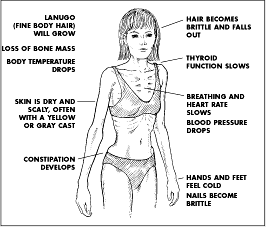Eating disorders
Eating disorders are serious behaviour problems. They include
- Anorexia nervosa, in which you become too thin, but you don't eat enough because you think you are fat
- Bulimia nervosa, involving periods of overeating followed by purging, sometimes through self-induced vomiting or using laxatives
- Binge-eating, which is out-of-control eating
Anorexia nervosa
- Extreme thinness (emaciation)
- A relentless pursuit of thinness and unwillingness to maintain a normal or healthy weight
- Intense fear of gaining weight
- Distorted body image, a self-esteem that is heavily influenced by perceptions of body weight and shape, or a denial of the seriousness of low body weight
- Lack of menstruation among girls and women
- Extremely restricted eating.
Bulimia nervosa
Bulimia nervosa is characterized by
- Recurrent and frequent episodes of eating unusually large amounts of food and feeling a lack of control over these episodes.
- This binge-eating is followed by behaviour that compensates for the overeating such as forced vomiting, excessive use of laxatives or diuretics, fasting, excessive exercise, or a combination of these behaviours.
 Unlike anorexia nervosa, people with bulimia nervosa usually maintain what is considered a healthy or normal weight, while some are slightly overweight. But like people with anorexia nervosa, they often fear gaining weight, want desperately to lose weight, and are intensely unhappy with their body size and shape. Usually, bulimic behaviour is done secretly because it is often accompanied by feelings of disgust or shame. The binge-eating and purging cycle happens anywhere from several times a week to many times a day.
Unlike anorexia nervosa, people with bulimia nervosa usually maintain what is considered a healthy or normal weight, while some are slightly overweight. But like people with anorexia nervosa, they often fear gaining weight, want desperately to lose weight, and are intensely unhappy with their body size and shape. Usually, bulimic behaviour is done secretly because it is often accompanied by feelings of disgust or shame. The binge-eating and purging cycle happens anywhere from several times a week to many times a day.
Binge-eating disorder
With binge-eating disorder a person loses control over his or her eating. Unlike bulimia nervosa, periods of binge-eating are not followed by purging, excessive exercise, or fasting. As a result, people with binge-eating disorder often are over-weight or obese. People with binge-eating disorder who are obese are at higher risk for developing cardiovascular disease and high blood pressure. They also experience guilt, shame, and distress about their binge-eating, which can lead to more binge-eating.
Psychological counselling for an eating disorder
Psychological counselling (psychotherapy) is generally the most important eating disorder treatment. It involves seeing a psychologist, mental health counsellor on a regular basis.
Counselling may last from a few months to years. A number of different methods of counselling are used to treat eating disorders. They include:
- Cognitive behavioural therapy. This type of counselling is a short-term, structured treatment that helps you address the thoughts, feelings and behaviours related to your eating disorder. It can help you learn to recognize and change distorted thoughts that lead to eating disorder behaviours.
- Interpersonal psychotherapy. Another short-term treatment, interpersonal psychotherapy focuses on resolving relationship issues that contribute to your eating disorder. This type of treatment may be especially helpful if you have depression along with an eating disorder.
- Family-based therapy. With family-based therapy, family members attend counselling sessions. This type of therapy can be especially useful for parents learning how to help a teen with an eating disorder.
- Group cognitive behavioural therapy. This type of treatment involves meeting with a psychologist along with others who are diagnosed with an eating disorder. It can help you address thoughts, feelings and behaviours related to your eating disorder, learn skills to manage eating disorder symptoms, and regain healthy eating patterns.
Treatment may involve a combination of types of counselling. Psychologist may ask you to do homework, such as keep a food journal to review in counselling sessions, and identify triggers that cause you to binge, purge or do other unhealthy eating behaviour.
For Psychological Counselling please contact us
The
“Psychologist” Psychological Counseling Centre’s at
Chennai:- 9786901830
Pondicherry:- 9865212055
Panruti:- 9443054168
97869 01830
Vivekanantha Psychological Counseling Centre Health Line
For appointment please Call us or Mail Us
Consultation by Appointment only
----


